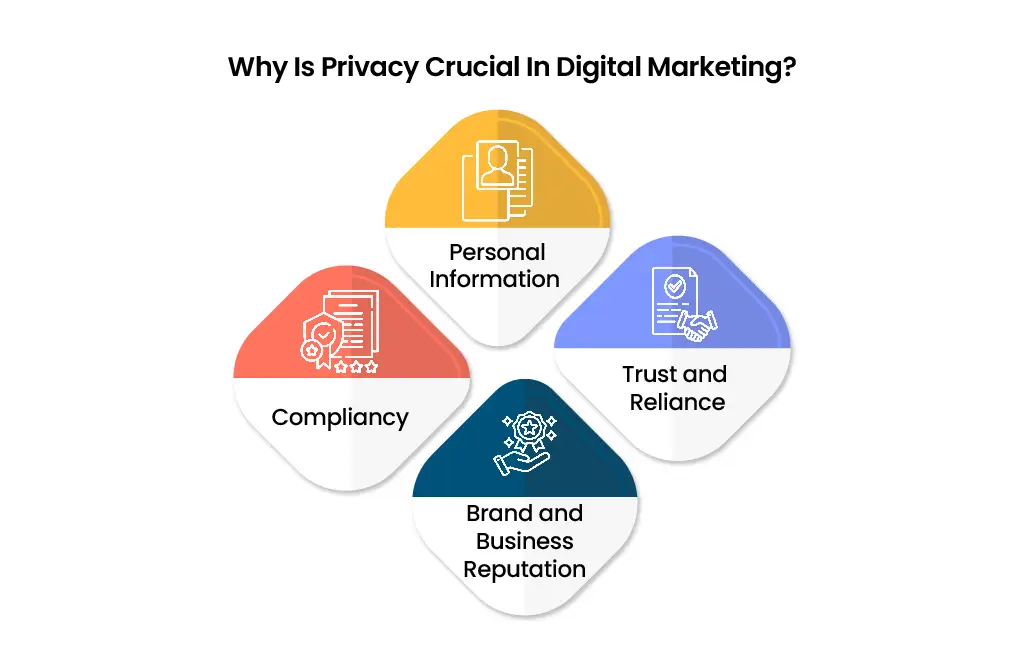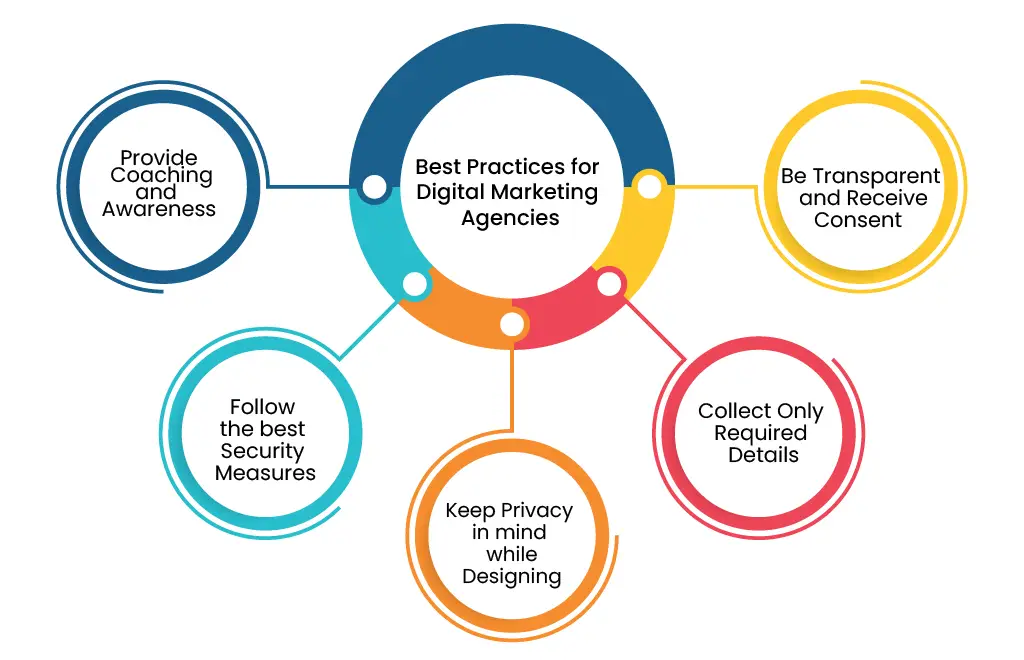
We, as humans, need a little privacy in our lives, right? We need a room of our own and don’t like it if someone spies on our phone. Somewhere, it is human nature to look for privacy, even during times when we extremely need love, care, and support.
We expect the same from digital marketers and their services. We solely trust digital marketing companies that respect our privacy and provide privacy-first services.
However, if you are a digital marketer, you should know how to protect your consumers’ data. This blog will replay the history of privacy in digital marketing, how it has changed over the years, and its importance in this era.
Data Privacy In Digital Marketing

Basically, digital marketers collect their customers’ private details and store them as data to provide customized services and products. The protection of this personal and private information is known as data privacy in digital marketing.
These Private Details Include:
Demographic Data
Browsing Patterns
Past Purchases
and so on.
However, digital marketers have the biggest responsibility to manage, maintain, and use their customers’ data in a proper way, or else it will hinder the business’s growth.
Here are three major principles of data privacy in digital marketing:
General Data Privacy Regulation
The European Union (EU) has established strict restrictions for digital marketers to collect, use, and manage the personal data of EU individuals. This severe EU privacy regulation sets severe restrictions for digital marketers on non-compliance and gives every EU individual the right to access and manage their data.
California Consumer Privacy Act
The California Consumer Privacy Act gives Californians the right to know the details of the data being collected and shared, and they can delete it as well.
Children’s Online Privacy Protection Act
COPPA restricts the collection of data of children who are under the age of thirteen, and it demands their parents’ consent and approval. This regulation has attained the highest standard of privacy.
These are just a few regulations that digital marketers must follow in their business to grow their business online without any unforeseen hurdles.
Violating any of these regulations can result in serious penalties, legal action, and reputation damage for your business. There is no need to worry, as InfinityHub is here to shed light on those regulations and their impacts.
What Are The Privacy Problems In Digital Marketing?
The privacy-related issues consumers face due to the misuse of data collected by digital marketers fall under the category of privacy problems in digital marketing. Consumers have their own concerns and worries about their personal details. If they are being shared without their consent and approval, it can create a sense of distrust and disbelief in digital businesses.
These ill-uses of information may result in identity theft and unauthorized access to consumers’ personal and private details.
Why Is Privacy Crucial In Digital Marketing?
Protecting the rights and interests of consumers is crucial in digital marketing. Consumers consider their data privacy superior to any other aspect. So, developing a privacy-friendly approach in your business is necessary.

Here is a list of factors that makes privacy crucial in digital marketing sphere:
Personal Information
Personal information ensures that consumers have authority over the gathering, usage, and disclosure of their details.
Trust and Reliance
When your consumers understand that their private details are safe and secure with your business, it can create a sense of trust and reliance.
Brand and Business Reputation
When you violate privacy regulations, it can create a sense of distrust and faithlessness in your consumers and damage your brand’s reputation.
Compliancy
Ensuring legal compliance is important for your digital business to grow and reach heights on online platforms.
How Data Privacy Regulations Impact Digital Marketing?

Here are a few impacts that privacy regulations have on digital marketing and marketers:
Increased Customer Trust and Loyalty
The timely implementation and maintenance of data privacy regulations such as GDPR in Europe and CCPA in the US have improved consumers’ trust and loyalty to Digital Marketing companies and businesses.
Increased Transparency
The digital business world demands that digital marketers maintain transparency about their data use and practices. Digital marketers who wish to increase transparency should ask themselves these three questions:
- What Details Are Being Collected About My Consumers?
- How Am I Going to Use Them?
- With Whom Am I Going to Share Them?
Also, clearly describe your customer data usage on your website pages to build trust and loyalty among your consumers.
Easy Data Access and Frequent Deletion Requests
Many privacy regulations in digital marketing give consumers the right to access and delete their information without any hardship. Thus, digital marketers should have the capability to respond to these requests immediately to build trust.
Challenges in Personalized and Targeted Marketing
Digital marketers’ biggest strength is personalized or targeted marketing strategies. However, privacy regulations impose certain limits and restrictions on their ability to collect consumers’ details, which they use to produce targeted campaigns or posts.
Shift in Advertising Strategies
These privacy regulations compel digital marketers to come up with brand-new advertising strategies to get fruitful results from their online marketing. A contextual advertising strategy can be an effective choice for digital businesses to flourish on online platforms and overcome the drawbacks of these privacy regulations.
Best Practices for Digital Marketing Agencies

Let us reveal to you a set of secrets to manage these privacy regulations efficiently:
Be Transparent and Receive Consent
Acquire enough consent from every individual before gathering their personal details for your business. Be transparent about how you are going to use the collected details for your business growth.
Collect Only Required Details
Digital marketers are advised to collect only essential details from their consumers and avoid asking for sensitive information unless it is necessary for proceeding with their service.
Keep Privacy In Mind While Designing
The best option to implement privacy in your digital marketing practice is by designing and developing an advertising strategy and surrendering most of it to the privacy of your consumers.
Follow The Best Security Measures
Digital marketers must follow powerful security measures to protect and prevent the confidentiality of their consumers’ data. Here is a list of things you should take note of to develop a strong and secure online marketing strategy:
- Encryption
- Access controls
- Regular security audits
- Employee training on data protection
Provide Coaching and Awareness
One of the important factors in producing a brand-new strategy for your business is teaching and training your employees about its protocols and procedures for effective results.
Conclusion
Privacy is your consumers’ prime concern. As a digital marketer, you must be flawless in it to grab your target audiences’ attention and build their trust and loyalty to your business and brand.
We hope this blog has given you an understanding of and the ultimate solution to your privacy regulation-related doubts.
To build the best digital advertising strategy that obeys all the privacy regulations, reach out to our experts at InfinityHub and expand your business in the digital world.
Frequently Asked Questions
Definitely. The best way to build your consumers’ trust and loyalty is to follow, protect, and secure their private data and use it with their consent. Thus, it makes privacy regulation essential for digital marketing agencies and businesses.
- Transparency and consent
- Data minimization
- Security measures
- Privacy by design
- Regular compliance audits
Surely. Our experts can surprise you with their marketing and privacy regulation knowledge and adeptness. Reach out to us today and build your business future
Popular Search
Get Free Quote
Facebook
Twitter
LinkedIn
WhatsApp

 India
India USA
USA


